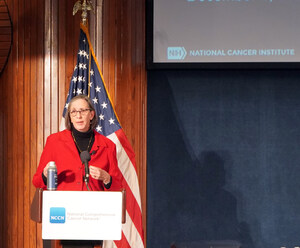Researchers find rates of breast cancer survivors receiving annual mammograms dropped 1.5% per year from 2009 to 2016, with largest decrease in survivors under age 50.
PLYMOUTH MEETING, Pa., April 7, 2022 /PRNewswire/ -- New research in the April 2022 issue of JNCCN—Journal of the National Comprehensive Cancer Network found the rate of mammography use by breast cancer survivors has been steadily declining since 2009, particularly among younger survivors. The researchers reviewed a nationwide commercial claims database to review annual mammography rates in patients aged 40 to 64 years with a personal history of breast cancer diagnosis.
For survivors between ages 50 and 64, they found approximately 74% were getting annual mammograms from 2004-2009, but the rate slipped to 67% by 2016. For the 40- to 49-year-old group, annual mammography rates held steady at 70% from 2004-2009 before dropping to 57% by 2016.
"Most people do quite well after completing their treatment for breast cancer, however some will have a recurrence of their prior cancer or develop a new breast cancer. Mammography is an important tool for detecting these cancers earlier, when they are smaller and more easily treated," said lead researcher Kathryn P. Lowry, MD, Assistant Professor of Radiology at the University of Washington School of Medicine. "I was surprised that we saw declines in mammography use among patients who were continuing to see their cancer specialists. It suggests we are seeing less frequent mammography participation even among those who are otherwise engaged in their cancer care. Our findings suggest we need to reinforce the importance of annual mammograms with our patients who have had breast cancer. We also need additional studies to better understand the barriers that are leading to fewer mammograms."
According to the results, annual mammography rates declined by approximately 1.5% per year from 2009-2016 overall, but that rate of decline jumped to 2.8% for survivors 40- to 49-years-old. The study authors note this is particularly concerning given that younger patients are more likely to develop aggressive tumors and also have a longer remaining life expectancy.
The results were examined by recency of surgery or primary care visit, neighborhood racial and socioeconomic demographics, geographic region, and deductible costs. The data were not conclusive on which specific factors are driving the decline.
"More research—through qualitative interviews—is needed to further define the barriers to care and optimal strategies for improved mammography retention in survivorship," commented
Amy M. Sitapati, MD, UC San Diego Moores Cancer Center, who was not involved in this research.
Dr. Sitapati, a member of the NCCN Clinical Practice Guidelines in Oncology (NCCN Guidelines®) Panel for Breast Cancer, continued: "This important study highlights the critical role of longitudinal tracking of breast cancer survivors, including mammographic screening. In today's systems and informatics-based records, we are not strategically prioritizing and reaching out to survivors using standardized and highly reliable processes. The downward trend in adherence to annual mammography in survivorship should serve as a call to action for new processes that identify and engage breast cancer survivors. Electronic Medical Records-based registries could serve a pivotal role for long-term follow-up with survivors."
The study time period concludes before the start of the COVID-19 pandemic, which researchers agree has been detrimental to cancer screening in general. Learn more about the importance of returning to pre-pandemic levels for cancer screening and treatment at NCCN.org/resume-screening.
To read the entire study, visit JNCCN.org. Complimentary access to "Trends in Annual Surveillance Mammography Participation Among Breast Cancer Survivors From 2004-2016" is available until July 10, 2022.
About JNCCN—Journal of the National Comprehensive Cancer Network
More than 25,000 oncologists and other cancer care professionals across the United States read JNCCN—Journal of the National Comprehensive Cancer Network. This peer-reviewed, indexed medical journal provides the latest information about innovation in translational medicine, and scientific studies related to oncology health services research, including quality care and value, bioethics, comparative and cost effectiveness, public policy, and interventional research on supportive care and survivorship. JNCCN features updates on the NCCN Clinical Practice Guidelines in Oncology (NCCN Guidelines®), review articles elaborating on guidelines recommendations, health services research, and case reports highlighting molecular insights in patient care. JNCCN is published by Harborside. Visit JNCCN.org. To inquire if you are eligible for a FREE subscription to JNCCN, visit NCCN.org/jnccn/subscribe. Follow JNCCN on Twitter @JNCCN.
About the National Comprehensive Cancer Network
The National Comprehensive Cancer Network® (NCCN®) is a not-for-profit alliance of leading cancer centers devoted to patient care, research, and education. NCCN is dedicated to improving and facilitating quality, effective, equitable, and accessible cancer care so all patients can live better lives. The NCCN Clinical Practice Guidelines in Oncology (NCCN Guidelines®) provide transparent, evidence-based, expert consensus recommendations for cancer treatment, prevention, and supportive services; they are the recognized standard for clinical direction and policy in cancer management and the most thorough and frequently-updated clinical practice guidelines available in any area of medicine. The NCCN Guidelines for Patients® provide expert cancer treatment information to inform and empower patients and caregivers, through support from the NCCN Foundation®. NCCN also advances continuing education, global initiatives, policy, and research collaboration and publication in oncology. Visit NCCN.org for more information and follow NCCN on Facebook @NCCNorg, Instagram @NCCNorg, and Twitter @NCCN.
Media Contact:
Rachel Darwin
267-622-6624
[email protected]
SOURCE National Comprehensive Cancer Network

WANT YOUR COMPANY'S NEWS FEATURED ON PRNEWSWIRE.COM?
Newsrooms &
Influencers
Digital Media
Outlets
Journalists
Opted In






Share this article